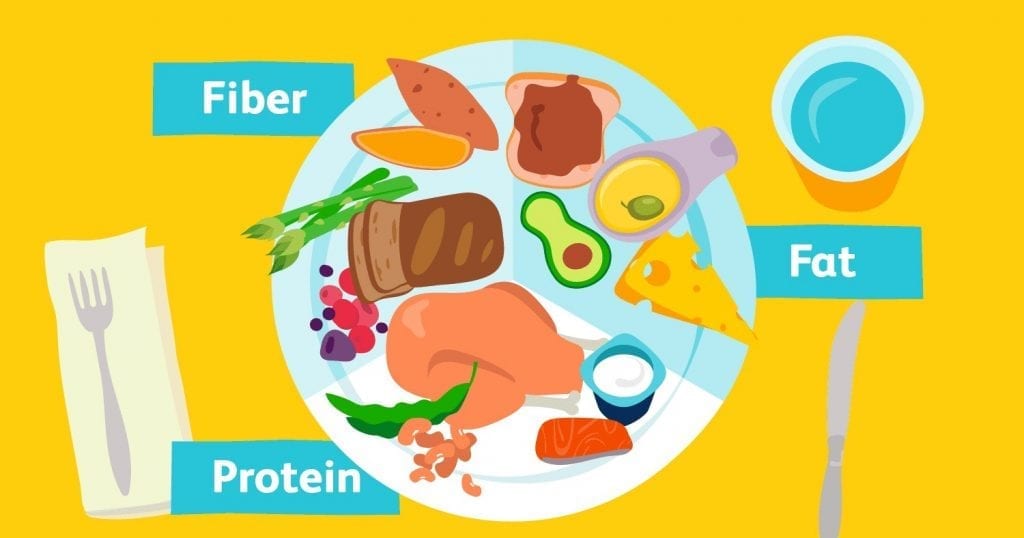What if you just can’t stop thinking about food, no matter what!?
Like even if you just ate an entire pint-sized container of ice cream and you still can’t stop thinking about food.
Constantly thinking about food can be the most frustrating thing in the world for many people!!
If you’d like to slow your mind down and stop thinking about food so much, great!
But I have one difficult truth that I’ll need you to face without getting emotional.
The hard truth is that you only have two options:
Option A) Continue as usual
Option B) Dig deep. Understand the problem. Understand what your fears are. Commit to implementing the solution.
I hope you’re ready to make a change and picked Option B.
If you are looking for a nice list of healthy foods to eat, great. We have that within the post. But we also need to talk about mindsets.
You can’t just change your thoughts because you ‘want to’. If it were that easy then nobody would ever struggle with food thoughts.
But since many people do struggle with food thoughts, it’s safe to say that if you want to change your thoughts, you have to do something different. You have to change your mindset.
This post is about Option B advice.
- Understanding why you can’t stop thinking about food from chemical and cultural perspectives
- How to stop thinking about food all the time by understanding the bare minimum of eating
- List of healthy foods to eat
- Prevent the typical eating disorder fears from coming up as you eat more healthy foods than you’re used to eating
To stop thinking about food all the time it will be helpful if we learn from ‘normal’ people to begin with.

Learn From People Who Don’t Think About Food All The Time
There are different ‘normal’ ways to eat that are perfectly fine and that healthy people follow.
What I am about to describe is simply the basic eating pattern for most normal people:
Timing
- Breakfast
- Lunch
- Afternoon Snack
- Dinner
- Evening Snack (maybe)
Every meal and snack is around 3-5 hours apart.
What Normal People Eat
At each meal and snack, a normal person eats a variety of foods.
They don’t just eat tons of bananas from the tree and call that a satisfying meal.
They don’t just eat peanut butter straight out of the jar and that’s it and call that a satisfying snack.
Normal people eat variety.
Most of the time, normal people eat the following when they do eat:
- A protein
- A fat
- A carb
The funny thing is oftentimes people who have a normal relationship with food might not even think about these “protein, fat, carb” food categories.
They just naturally gravitate towards eating:
- Regularly 3-5 times per day every 3-5 hours
- A variety of foods, often a protein, fat and carb when they eat

Why Eating Regularly With Variety Leads To Less Thinking About Food
To keep things simple, you have two significant chemicals that regulate your hunger:
- Ghrelin
- Leptin
This 2007 study talks about how these chemicals impact your thoughts about food:
- More Ghrelin chemical increases your hunger (and your thoughts about food)
- More Leptin chemical decreases your hunger (and your thoughts about food)
Ghrelin
Ghrelin begins to increase in the body about 3 hours after eating.
So if you start getting hungry in 3 hours … then around 4 hours you’ll be pretty darn hungry … and at 5 hours you’ll be very hungry.
After you eat though …
Leptin
Leptin gets released after you eat.
Then your hunger goes down.
But the most important thing to know about Leptin is that Leptin is easily dysregulated.
For example, obese people who have their leptin levels measured clearly show leptin chemical signalling not working properly.
What ends up happening is obese people think they are still hungry because their leptin chemicals aren’t communicating to the brain properly.
But it’s not just obese people who suffer from dysregulated Leptin …
Leptin levels can become dysregulated after binge eating or heavy periods of overeating.
This leads to a vicious cycle:
- Eat more, get more fat in system
- More body fat = more leptin
- Proper leptin signalling becomes dysregulated
- The brain thinks you’re starving
- You want to eat more (because your brain is making you think about food so that you eat)
- You eat too much again because your leptin signals were off. Get more fat and leptin.
- Repeat. Develop bad habits.
To Stop Thinking About Food You Must Eat Regularly
A normal person has a good relationship with food.
They aren’t obsessed with food or hunger because their ghrelin and leptin levels are regulated properly.
This is the bare minimum of food you need, the same general amount as a normal person.
As discussed earlier, this bare minimum means:
- Eating regularly 3-5 times per day every 3-5 hours
- A variety of foods, often a protein, fat and carb when they eat
Got it? And do you get that even though this may sound like a lot of food, it’s not!
Now, I know you have some questions, which I will address in the next two sections. Let’s start with perhaps the most common question – when to eat!
List Of Healthy Foods To Eat With Approximate Schedule
The following is written in mind with a 7:30 am wake up time. If your schedule is different then please adjust accordingly.
Keep in mind how the meals and snacks are spaced 3-5 hours apart, because that’s when we know your ghrelin levels in your stomach will be starting to fire.
If you don’t eat when your ghrelin starts to fire, those levels will get too high and you’ll end up overeating.
(How to know if you need more food? If you are still hungry 1 hour after you eat, you didn’t eat enough, so increase the amounts by a little and try again next time. Also, if you end up overeating, you need to adjust the amount downwards.)
I’ll give both measurements and ways to approximate serving sizes. Here’s a graphic that also demonstrates this nicely:
Breakfast 8 am
- Cooked Oats (1 cup, size of your fist) Carbs
- Nuts (2 oz, size of your thumb) Fat
- Yogurt (4 oz, size of your palm) Protein
- Berries (Half cup, your fingers)
Notice how you got your proteins, fats, and carbs within this breakfast?
Also, please notice how much you ate:
– Thumb of fats
– Palm of protein
– Fist of carbs
(Again, if you are feeling ravenously hungry by lunch time, you need to eat more for breakfast. I know sometimes eating this much, as listed above, for breakfast can seem frightening to some, and I will address those fears in the next section.)
Lunch 12 pm
- Spinach (1 cup, size of your fist) Carbs
- Olive oil (2 oz, size of your thumb) Fat
- Chicken (4 oz, size of your palm) Protein
- Something yummy 🙂 croutons?
Afternoon Snack 3 pm (Lunch #2)
Sometimes it’s best to think of this “snack” as lunch #2. This isn’t just a little snack, it’s meant to properly fill you up.
Oftentimes this snack is the secret to preventing overeating late at night.
If you get full now, like truly satisfied, and then you get another truly satisfying dinner, those thoughts and cravings about food are going to die down for certain.
- Banana (whole)
- Graham Crackers (2 full)
- Peanut butter (2 oz, size of your thumb)
Dinner
- Cooked brown rice (1 cup, 1 fist)
- Fish / Veggie burger
- Veggies (1 cup)
- Olive oil (2 oz, size of your thumb)
Evening Snack
- A bowl of ice cream
- Ice cream bar (my favorite!)
- Get some sugar, ok!
- Honey?
I’m not going to say ‘have fun’ because ideally all your meals are fun, and just overall be sure to try to enjoy your food!
If you eat regularly, and don’t skip meals (including the snacks), the ghrelin and leptin levels in your stomach will normalize.
Your thoughts about food will diminish; they’ll only resurface like a normal person’s thoughts about food – right around the time before you eat. You won’t be stuck in your head all day.
Of course, you probably have heard some of this common sense before. Most likely you have tried some of this stuff before.
(Hopefully, though, you got a few new tidbits! Let me know in the comments!)
So what got in your way last time? How can you overcome your doubts? How can you trust yourself around food?
Overcoming Doubts, Distrust and Disbelief
In many ways my job as an eating counselor coach is simply to help you overcome your quite natural and understandable doubts, distrust and belief.
I italize quite natural because indeed, food struggles are quite natural.
For example, at my work at Cielo Outpatient Eating Disorder Clinic, we see many people who are normal. People who have jobs, families and a ‘healthy’ BMI come in with full-blown eating disorders.
This just goes to say that people with these attributes:
- Normal BMI
- Live normal lives
- Friendly
- Considerate
- Good at their job
All of these normal people can still struggle with food, not least because we live in a crazy food society!
Think about … the weight loss / diet / wellness industry is worth a Trillion Dollars worldwide. That’s as big as Amazon.
The weight loss / diet / wellness industry has been around since forever. We’ve been spending:
- Time
- Energy
- Soul force
- Self-esteem
We’ve been spending our life’s valuable-ness away for years! And we have nothing to show for it!
The ‘war on obesity’ didn’t work!
Food is not an easily solved problem and so yes, it truly is quite natural to have some food struggles. But the good news is simple: you can transform your eating habits and stop thinking about food all the time.
Now, I know you’ve been promised things before (losing 1-3 lbs per week, burn fat fast, appetite suppressant to make you not hungry, etc, etc …)
So, again, I repeat, it makes perfect sense and is quite natural to be hesitant or anxious.
The Missing Stool Leg Analogy.
If a stool gets 2 out of 3 legs, how does it do?
It falls down.
1 leg? Still falls down.
0 legs? Still falls down.
You need all 3 legs to stand up and be stable in the center.
If you’re missing a piece, then no matter how hard you try, you’ll end up falling down.
Food is similar, most people have 1 or 2 legs, but they either:
- don’t quite have the regular eating down or …
- aren’t connected to their body because their physiology has gone through so many eating struggles over the past decades.
With that being said, here are some common questions that come up, spoken or unspoken:
Will I gain weight?
No. Study after study has shown that yo-yo dieting, as opposed to the consistent “bare minimum” approach that I described above, leads to weight gain.
And to be clear on terms, yo-yo dieting is where you diet, but then fall off the wagon and overeat. And then you gain back the weight you lost.
It’s about eating consistently, in a way that nourishes you and sustains you.
Eating healthy, real food in a regular way with balance will not make you fatter.
I’ve tried this before, what’s different now?
In this article here I haven’t talked much about your basic needs.
Basically, you make sure your fundamental human needs for food and safety are being met.
A previous diet you were on likely either didn’t give you enough food to meet your food needs, or you felt unsafe or pressured when you were on the diet to lose weight.
It’s really important in the meal plan outlined in this article that:
- You feel content physically after you eat. This means you feel comfortably full. That your stomach is not immediately hungry afterwards.
- You feel satisfied from a mental and emotional standpoint. This means you aren’t filled with regret about foods you missed out on.
If you feel this way, then you will stick to this meal plan because it meets your basic needs. But, again, you may need to eat more food than what I suggested initially, and hence that’s why I have used the term ‘bare minimum of food’ throughout.
I can’t trust myself around food. I always lose control.
No, you lose control because you don’t eat enough.
You are not aware of how much food you are skipping and not eating.
(You may also be eating pretty regularly but be eating very skimpy portions.)
When you accidentally skip meals because you forget, you get too stressed or any other reason…
Your basic need for food is not met, and then your body will hijack your brain to make you eat more food.
And how does your brain convince you to give in? Your brain makes it impossible to stop thinking about food all the time!
That’s why you can’t stop thinking about food!
Yes, you are losing control, but that’s because you aren’t eating enough.
I’m hopelessly fat.
No. This isn’t about weight loss.
The whole premise of ‘health at every size’ (one of the concepts we use at Eating Enlightenment} is that you can become healthier at any weight.
So, let’s take a worst case scenario – let’s say you are 500 lbs.
Well, a 500 lbs person typically is not considered ‘healthy’. And so the term ‘health at every size’ is confusing in this respect.
However, you can become healthier at any size.
Even if you weigh 500 pounds:
- You can still sleep more
- Meditate more
- Eat more real foods at regular intervals
- Do easy movements
Do you get the point?
Sure, your health may never be perfect or ‘good’ but you can still make progress and that’s what counts.



